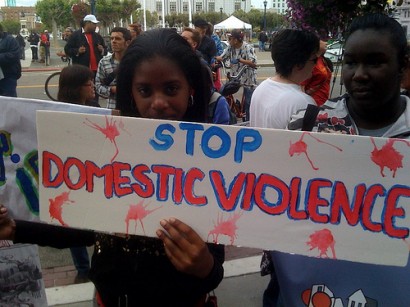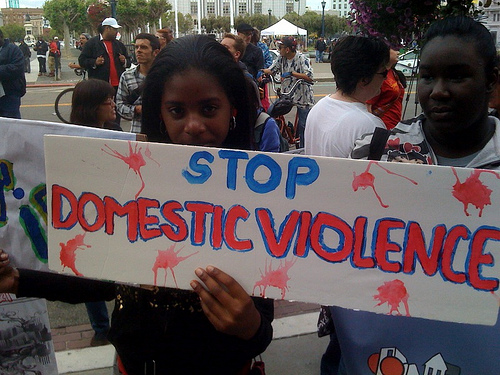
A rally against domestic violence. (Photo: Steve Rhodes/flickr)
I have a friend who told me about the physical, psychological, and emotional abuse inflicted upon him by a boyfriend who threatened to report him to authorities for not having any papers. He shared with me how hopeless he felt, unable to seek help, fearful that he would be deported. Thankfully, he got out of the relationship and has since gained legal status.
Sadly, there are many immigrants who are not as fortunate and who have no choice but to quietly suffer for the sake of their children and family members here and abroad who depend on them.
Since 1994, the Violence Against Women Act (VAWA) has been a glimmer of hope for immigrant women in abusive relationships. It gave them access to programs and services that are culturally and linguistically appropriate and provided them with much needed legal protections and aid.
A month ago the Senate voted 68 to 31 to reauthorize VAWA. The bipartisan bill, introduced by Senators Patrick Leahy (D-VT) and Michael Crapo (R-ID), expands VAWA to include particularly vulnerable groups. The statute would subject non-American Indian suspects of domestic violence to prosecution before tribal courts; increase the number of temporary visas for unauthorized immigrant victims of domestic violence; and expand VAWA protections to lesbian, gay, bisexual and transgender (LGBT) victims of domestic abuse.
Last week, the Republican-led House voted to pass its own version of VAWA, stripped of the Senate bill’s protections for American Indians, immigrants, and LGBTs. Human Rights Watch calls the House bill “regressive” and is alarmed that it includes “sweeping changes to existing legal protections for immigrant victims of sexual and domestic violence.” If enacted, the House bill would make it more difficult for abused foreign-born spouses of U.S. citizens and permanent residents to apply for stable immigration status. It would allow government adjudicators to receive information from alleged abusers about their spouse’s immigration application. In addition, the House bill only allows a small subset of victims to apply for U visas, which permit an immigrant victim of a serious crime to temporarily stay in the country to assist law enforcement in investigating and prosecuting crimes.
The decision of the House leadership to water down the Senate bill has caused an uproar among proponents of an expanded and more inclusive VAWA.
Rep. John Conyers (D-MI), wrote in Politico about the House bill:
When I helped draft the Violence Against Women Act nearly twenty years ago it was grounded on the bipartisan belief that we should protect all women from sexual and domestic violence, particularly vulnerable minority and immigrant women. Now, behind the veil of reauthorizing certain grant programs, this bill would roll back the very protections that Republicans once championed. Specifically, the bill eliminates provisions that protect immigrant victims of serious crimes, such as trafficking, who want to help law enforcement put dangerous criminals behind bars and it weakens critical and longstanding provisions that allow the battered immigrant spouses of US citizens to escape those abusive relationships and obtain the permanent immigration status to which they are already entitled. These provisions were enacted in past VAWA bills with near-unanimous congressional support.
Presently, the reauthorization of VAWA, which expired last September and whose programs are surviving on temporary funding, is stalled because both the House and Senate refuse to budge. McClatchy’s Sean Cockerham reported that Sen. Crapo is uncertain if and how the impasse can be broken.
“I think there’s a bit of a stare-down going on there with the House leadership and the Senate leadership,” Crapo said.
Democrats and Republicans are accusing each other of election year politicking. That may be true, but it cannot be denied that American Indian, immigrant, and LGBT victims of abuse need protection just like any other victim.
Unauthorized immigrant women and LGBTs who are abused are rendered mute and defenseless as their immigration status becomes one more method of control used by their abusers. The New York Times reported on the desperate lives of abused Native American women who have no support or recourse for justice.
Whatever the Senate’s motivations might be behind expanding VAWA, what is so wrong about coming to the aid and defense of those who need it most? Isn’t that the right and decent thing to do?
You can follow Erwin de Leon on Twitter or read his blog.
Fi2W is supported by the New York Community Trust and the John S. and James L. Knight Foundation with additional support from the Ralph E. Odgen Foundation and the Sirus Fund.


A rally against domestic violence. (Photo: Steve Rhodes/flickr)
I have a friend who told me about the physical, psychological, and emotional abuse inflicted upon him by a boyfriend who threatened to report him to authorities for not having any papers. He shared with me how hopeless he felt, unable to seek help, fearful that he would be deported. Thankfully, he got out of the relationship and has since gained legal status.
Sadly, there are many immigrants who are not as fortunate and who have no choice but to quietly suffer for the sake of their children and family members here and abroad who depend on them.
Since 1994, the Violence Against Women Act (VAWA) has been a glimmer of hope for immigrant women in abusive relationships. It gave them access to programs and services that are culturally and linguistically appropriate and provided them with much needed legal protections and aid.
A month ago the Senate voted 68 to 31 to reauthorize VAWA. The bipartisan bill, introduced by Senators Patrick Leahy (D-VT) and Michael Crapo (R-ID), expands VAWA to include particularly vulnerable groups. The statute would subject non-American Indian suspects of domestic violence to prosecution before tribal courts; increase the number of temporary visas for unauthorized immigrant victims of domestic violence; and expand VAWA protections to lesbian, gay, bisexual and transgender (LGBT) victims of domestic abuse.
Last week, the Republican-led House voted to pass its own version of VAWA, stripped of the Senate bill’s protections for American Indians, immigrants, and LGBTs. Human Rights Watch calls the House bill “regressive” and is alarmed that it includes “sweeping changes to existing legal protections for immigrant victims of sexual and domestic violence.” If enacted, the House bill would make it more difficult for abused foreign-born spouses of U.S. citizens and permanent residents to apply for stable immigration status. It would allow government adjudicators to receive information from alleged abusers about their spouse’s immigration application. In addition, the House bill only allows a small subset of victims to apply for U visas, which permit an immigrant victim of a serious crime to temporarily stay in the country to assist law enforcement in investigating and prosecuting crimes.
The decision of the House leadership to water down the Senate bill has caused an uproar among proponents of an expanded and more inclusive VAWA.
Rep. John Conyers (D-MI), wrote in Politico about the House bill:
Presently, the reauthorization of VAWA, which expired last September and whose programs are surviving on temporary funding, is stalled because both the House and Senate refuse to budge. McClatchy’s Sean Cockerham reported that Sen. Crapo is uncertain if and how the impasse can be broken.
“I think there’s a bit of a stare-down going on there with the House leadership and the Senate leadership,” Crapo said.
Democrats and Republicans are accusing each other of election year politicking. That may be true, but it cannot be denied that American Indian, immigrant, and LGBT victims of abuse need protection just like any other victim.
Unauthorized immigrant women and LGBTs who are abused are rendered mute and defenseless as their immigration status becomes one more method of control used by their abusers. The New York Times reported on the desperate lives of abused Native American women who have no support or recourse for justice.
Whatever the Senate’s motivations might be behind expanding VAWA, what is so wrong about coming to the aid and defense of those who need it most? Isn’t that the right and decent thing to do?
You can follow Erwin de Leon on Twitter or read his blog.
Fi2W is supported by the New York Community Trust and the John S. and James L. Knight Foundation with additional support from the Ralph E. Odgen Foundation and the Sirus Fund.
AboutErwin de Leon